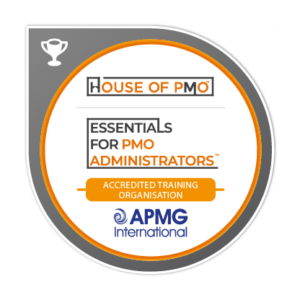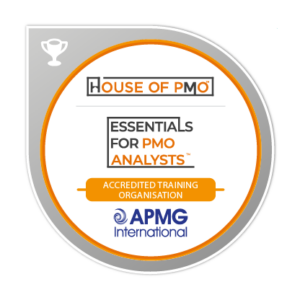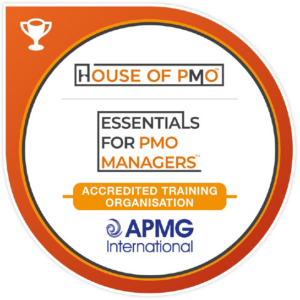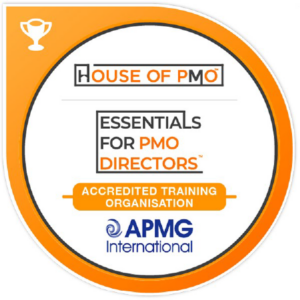
We’re going to be taking a closer look at the role profile of the PMO Manager, as outlined by the Essentials for PMO Managers course and the PMO Competency Framework.
The PMO Competency Framework outlines four key PMO Roles – the PMO Administrator, the PMO Analyst, the PMO Manager and the PMO Director. Each role may have a slightly different variation in title, for example the PMO Administrator may be referred to as a Project Support Officer, or Project Co-ordinator.
There are five key areas to each role profile – purpose, key responsibilities, key knowledge, key skills, and key behaviours. Let’s take a look at each aspect in turn.
Purpose
The purpose of the PMO Manager role is to set up, run, transform and close an office that supports P3M delivery and capability. In some organisations this role may be combined with delivery responsibilities.
Key Responsibilities
The responsibilities of a PMO Manager vary from governance, to team development, to resource management – they should promote a culture that motivates and inspires excellent P3M performance, design, implement and support the use of effective P3M tools, develop reporting frameworks, define clear roles and responsibilities and conduct PMO health checks to ensure the smooth delivery of projects and programmes.
This is a vastly diverse role, and will look different in every organisation.
Key Knowledge
The key knowledge of a PMO Manager may include:
- Change and delivery methods and associated controls from conception to benefits, e.g. MoP®, PRINCE2®, Scrum, Lean etc.
- Corporate language and communication, culture (including risk and change appetite, organisation politics), context and current priorities
- Business operating model along with corporate metrics and measures (KPIs, OKRs etc.) and associated tools and techniques
- Corporate vision, strategic aims and strategy, as well as the industry within which the organisation operates
- P3M and PMO theories and practice, including maturity models
- Service management concepts and frameworks
- The organisation’s governance structure and who’s who (along with customer and supplier organisations as appropriate) and the relationships between these parties
Key Skills
The key skills of the PMO Manager can be categorised into four groupings, which we’ll look at in more detail below.
- Self
- Balance competing needs and interests – the ability to assess the needs and interests of multiple stakeholders and determine an optimal course of action.
- Exercise Professional Judgement – the ability to combine personal qualities with relevant context and P3M knowledge and experience to form sound opinions and make decisions in the absence of clear data.
- Relationships
- Coach and Mentor – the ability to provide one to one support to another person in the development of their skills, knowledge or performance.
- Consult – the ability to effectively provide professional or expert advice.
- Delegate and Empower – the ability to give responsibility, physically and mentally, to another person for a task/decision, and instill the confidence in that person to self-determine how to fulfill these responsibilities.
- Engage – the ability to make a connection with another person for the purpose of communication or collaboration.
- Manage Conflict – the ability to develop and deploy strategies to reduce negative impacts and increase the positive mpacts of differences of opinions or beliefs between yourself and others, or between others.
- Motivate – the ability to observe and check progress or quality over time in a structured way, without impacting the operation or condition.
- Problem Solving
- Data Assimilation – the ability to merge and synthesize data.
- Think Strategically – the ability to think rationally and intentionally that focuses on the analysis of critical factors and variables to influence long term success.
- Communications
- Influence Others – the ability to have an impact on the action, behaviour, or opinions of others, without using force or coercion.
- Inspire – the ability to make someone feel that they want and are able to do something.
- Think Creatively – the ability to look at problems or situations from new perspectives to identify innovative approaches to addressing them.
Key Behaviours
The Essentials for PMO Managers course and the PMO Competency Framework outlines 16 key behaviours for the role of the PMO Manager:
- Pay attention to detail, but be pragmatic – keep the bigger picture in mind
- Take ownership of tasks and complete promptly, keeping customer up to date of progress and task completion
- Act with discretion and integrity, maintaining an appropriate level of confidentiality
- Be open and honest, take time to build relationships, credibility, and trust
- Recognise the limits of your expertise and continue to develop your knowledge and skills
- Be a team player, being a role model for the core values and behaviours of the organisation
- Be proactive and use initiative to achieve a successful outcome for all those involved in a timely manner
- Be tenacious and act assertively as appropriate
- Be resillient and maintain a positive attitude
- Probe and challenge confidently, in a professional manner
- Be curious and look beyond the obvious; recognising non-verbal behaviours to get to the real picture
- Provide candid feedback and recommendations in a constructive manner
- Remain objective, reserving judgement until all the information has been assimilated or where limited information is available, use professional judgement to make timely decisions
- Be open to challenge and debate; avoid being wedded to a single solution
- Work with passion and compassion, maintaining a growth mindset
- Pratice what you preach
Where can I find out more?
If you’re looking to find out more about the PMO Manager role, or any of the other PMO roles, the PMO Competency Framework provides the purpose, key responsibilities, key knowledge, key skills, and key behaviours of each role, as well as allowing readers to establish your competency is by completing a self-assessment using the PMO Competency Framework – find out how to use the framework to develop here!
Alternatively, why not join us on the Essentials for PMO Managers certification course? This three day course helps delegates to gain the essential knowledge and understanding to undertake the role of a PMO Manager, discover the fundamentals of the design, set up, implementation, running and closing down of a PMO service and articulate the core roles and responsibilities of a PMO Manager role.
Enjoying Our Blog?
Sign up and receive all our articles (we’ll send you an update once a week!) plus special offers and events:
This post contains affiliate ad links.
The MoP® courses on this page are offered by PMO Learning. MoP® is a [registered] trade mark of AXELOS Limited. MoP® is a registered trade mark of AXELOS Limited, used under permission of AXELOS Limited. All rights reserved.












